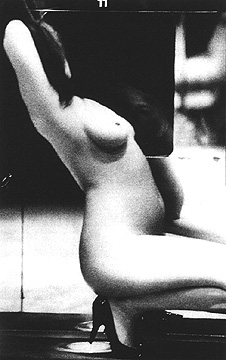 Seattle's erotic dancers could be instigating a wave of change in business as usual, but the scene in Seattle does not necessarily appear ready for reform. All of Seattle's erotic dancers are private contractors; at peep shows like the Lusty Lady they are employees: they make an hourly wage and have certain rules governing their routines and appearance that dancers at other clubs don't have. At clubs like Deja Vu, dancers pay the club a fee to dance, and, some would say, operate more like private contractors than employees. Employees have the right to unionize and private contractors have the right to dictate their own working conditions. What do erotic dancers have?
Seattle's erotic dancers could be instigating a wave of change in business as usual, but the scene in Seattle does not necessarily appear ready for reform. All of Seattle's erotic dancers are private contractors; at peep shows like the Lusty Lady they are employees: they make an hourly wage and have certain rules governing their routines and appearance that dancers at other clubs don't have. At clubs like Deja Vu, dancers pay the club a fee to dance, and, some would say, operate more like private contractors than employees. Employees have the right to unionize and private contractors have the right to dictate their own working conditions. What do erotic dancers have?
The Lusty Lady in San Francisco ratified the nation's first sex worker union contract this April after a year-long battle with its workers. The Lusty's dancers organized after theater management repeatedly dismissed complaints about customers filming dancers through the club's one-way mirrors. Although the one-way mirrors were eventually removed, Lusty Lady management continued to deny dancers' efforts at unionization.
One San Francisco dancer says, "Though the one-ways were gone, the power inequity their presence symbolized was still festering: favoritism was the norm, the company's disciplinary policy was unwritten, erratically and inconsistently applied, dancers had their pay cut in half for missing a staff meeting or calling in sick, and were suspended for reasons like not smiling enough."
Even after an arduous struggle and ratification of a union contract, the workers in San Francisco are still strapped with an open shop, which means union membership is not required. With the rapid turnover in the sex industry, this open shop policy continually threatens to invalidate unionization.
According to Morgan, a sex industry worker who edits the Seattle-based newsletter Blackstockings, unionization at Seattle's Lusty Lady is dubious. Despite the prospect of job security and legal recourse for unfair treatment, the still strained situation between management and staff at San Francisco's newly unionized Lusty has Seattle employees thinking twice about pushing for reforms here.
"The general consensus up here is that it's a very tense situation [at San Francisco's Lusty Lady] and that we don't want to be there," says Morgan.
 Dancers at clubs like Deja Vu throughout Washington live off customer tips and pay varying amounts to the house in order to work. At Deja Vu dancers sign independent contractor agreements and are not entitled to earn an hourly wage, file discrimination claims, receive unemployment benefits or worker's compensation, or take part in collective bargaining. On the flip side, they are allowed more flexibility in scheduling and tax declaration.
Dancers at clubs like Deja Vu throughout Washington live off customer tips and pay varying amounts to the house in order to work. At Deja Vu dancers sign independent contractor agreements and are not entitled to earn an hourly wage, file discrimination claims, receive unemployment benefits or worker's compensation, or take part in collective bargaining. On the flip side, they are allowed more flexibility in scheduling and tax declaration.
Susan*, a dancer at Deja Vu on Denny Way, likes the freedom and money attendant with being a private contractor- as opposed to an employee. State law mandates that employees cannot perform completely nude, which Susan fears would slow down business.
However, contractors at Deja Vu have few of the freedoms that other contractors enjoy: they have to work a minimum of six hours per shift; the music they use is screened and sometimes banned by management; and they tip out an average of one third of their earnings to cover their stage fee and voluntary gratuities to club disc jockeys, waitresses, bartenders, and doormen.
Safety and comfortable working conditions are two other problems topping the list of common complaints. "We feel that they [management] want customer dollars over the girls' safety," says Susan. "We have a floor manager and a couple of doormen, but they don't get the job because they're big or trained about security. They get their jobs because they're perverts."
Morgan echoes these sentiments, saying, "The attitude in the clubs as far as management and non-dancing staff is that the dancers are there to feed money to the boss and the staff isn't there to protect the dancers."
Apparently fed up with the conditions of independent contract work in the sex industry, 93 Deja Vu dancers in Washington recently filed a suit (Langlois v. Deja Vu) against the company under the Fair Labor Standards Act. While the terms of a settlement reached this month are suppressed by a confidentiality clause, similar suits throughout the country are using the same precedents to prove that erotic dancers are employees.
Dancers in a 1994 case against Deja Vu in Minnesota won minimum wages based on the argument that "the most significant element in determining whether a worker is an employee is the employer's right to control the worker's performance," says lawyer Carrie Benson Fischer. In other words, independent contractor agreements are nullified if workers act as or are treated as employees.
The Supreme Court, in 1958, formulated rules to distinguish between contractors and employees. The right to control the means and manner of performance, control over work premises, the right of the employer to terminate a worker, and dependence on a worker for the hiring party's business all indicate an employer-employee relationship.
Courts throughout the country have increasingly sided with nude dancers in private contractor vs. employee disputes, which may explain Deja Vu's willingness to settle. If erotic dancers at Deja Vu do become employees, the next logical step would be unionization, but Morgan thinks organization is unlikely.
"There's a lot of competition especially because the sex worker population is being thinned out on the outskirts, from Federal Way, Bellevue and Shoreline, and those women are coming to Seattle," Morgan says. Recent citizen initiatives in the suburbs have shrunk the industry. "Plus the fact that they have to pay out so much means that they get more desperate to make money, so there's more prostitution. . .and more drugs in the clubs; and those kinds of things make organizing really difficult because everyone hates each other because they're all competing so hard."
*Name has been changed.
COYOTE (Call Off Your Old Tired Ethics),
Exotic Dancers Alliance,
Danzine, and
Blackstockings at P.O. Box 18751, Seattle, WA 98118.
 |
 |
 |
 |
 |
Contents this page were published in the January/February, 1998 edition of the Washington Free Press.
WFP, 1463 E. Republican #178, Seattle, WA -USA, 98112. -- WAfreepress@gmail.com
Copyright © 1998 WFP Collective, Inc.